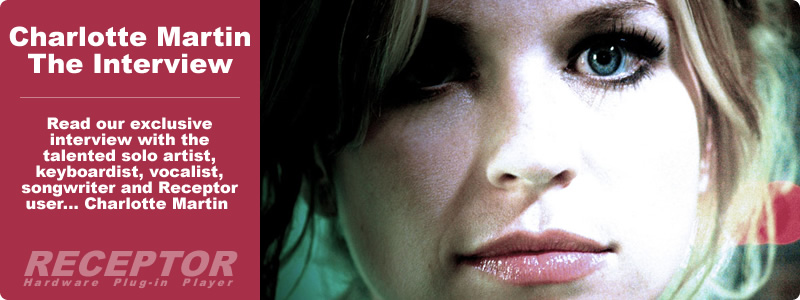
Charlotte Martin…how very nice to meet you! Let's start by having you tell us a little about your background…
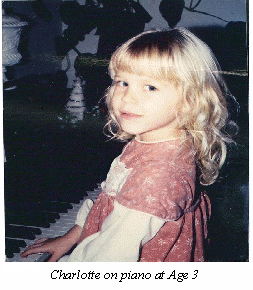 Well, I'm originally from Charleston, Illinois, a small farm town about an hour south of Chicago. Both of my parents are musicians; my father is an Oboe professor and my mom was a music teacher for many years. I grew up around music and started playing Piano at age 3, and then when my parents figured out I could sing, I started voice lessons when I was about 7. I continued through high school and went to college and studied opera.
Well, I'm originally from Charleston, Illinois, a small farm town about an hour south of Chicago. Both of my parents are musicians; my father is an Oboe professor and my mom was a music teacher for many years. I grew up around music and started playing Piano at age 3, and then when my parents figured out I could sing, I started voice lessons when I was about 7. I continued through high school and went to college and studied opera.
My goal was to teach, I intended to go on to grad school, but half way through my senior year one of my best friends took her own life. I didn't know how to respond, and the way I dealt with it was I wrote a song for her funeral. I'd never written a song before - I didn't have any background in composition- that tragedy just kind of turned it on for me, so I continued to write, graduated and shifted my plans. Instead of going to grad school, I packed my car and drove to LA.
When you were studying opera, did it ever dawn on you that you'd go into rock and write your own songs?
Never. Nor did I have the idea of becoming a composer... My life from early on was strictly classical. I was very intense about it. I wanted to do it, and I sacrificed a lot of extra curricular stuff to do voice and piano,. Then around 13 or 14, I started studying opera with Dawn Upshaw's teacher, and had 3 coaches and started competing at 16… I went to the Young Met auditions, doing Puccini,… I went after some really hard repertoire very young.
So it seems that your move into writing songs and moving to LA was pretty much unplanned, sparked by tragedy, and somewhat serendipitous?
It was. My friend passed away at New Year, and I didn't graduate until that Fall, so I wrote through that period. I did audition for grad school and various coaches, but my heart wasn't in it at that point. My heart was turning more and more towards that group of songs I'd written. It was hard, because my intellect was saying that I had to go on to grad school, and my heart was saying that I should take the money I saved for grad school and try to see if I can make these songs happen… It was pretty intense.
Quite the leap of faith…and pretty scary for a single woman…
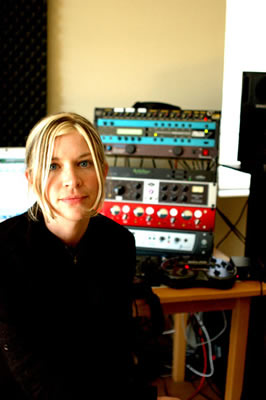 But I was not afraid enough to back out apparently! Sure, I was lonely when I first moved to LA, but I think I was smart… It was terrifying for me to drive in LA, so I stayed in my little apartment and wrote music and practiced for about 8 hours a day. So about 9 months after doing that, booked my first show and got signed to Bongload Records, got my first manager, and four months later I was showcasing for major labels. I had about a year's worth of money saved up, and it was about a year and four months before I finally had a record contract.
But I was not afraid enough to back out apparently! Sure, I was lonely when I first moved to LA, but I think I was smart… It was terrifying for me to drive in LA, so I stayed in my little apartment and wrote music and practiced for about 8 hours a day. So about 9 months after doing that, booked my first show and got signed to Bongload Records, got my first manager, and four months later I was showcasing for major labels. I had about a year's worth of money saved up, and it was about a year and four months before I finally had a record contract.
That's actually pretty quick.
Yeah, it was pretty quick. My whole thing was if I ran out of money, then I would have given it a year (which is not really enough time, looking back) and it didn't work out, then I'd go back to grad school and take out loans.
So you had a plan B…
I had a plan B, and I wasn't afraid of plan B. And it just so happened that Plan A worked out. I'm not famous by any means….
But you will be after this interview, of course…
(laughs) But I make enough to pay the bills and I've been making a living making music ever since.
Let's explore that a little bit. A lot of people don't have a plan B. Being a performer is their only thing, and even then they typically only do one style of music. How important do you think it is to develop enough diversity so that you have something else to fall back on. For example, if you are a vocalist, you also develop your songwriting skills. Of if you're an instrumentalist, you develop your skills as a vocalist?
I think its super important, especially now, because the music business is as an entity is changing very quickly. With all the downloading that has hit our industry in the last 10 years, and all the changes in technology and records store closing. There is another market available if you have the right skills. There's a whole other world of syncs (music for multimedia, TV, Film, or games) songwriting for others, and yes, playing your instrument but in a different style of music…
So you're saying you had a back up plan if the main goal didn't work out, and you wanted to diversify your skills even with respect to your main goal?
A. Yes. I dove into developing other skills as much as I could as soon as I had the funds and the know-how. Right after I got signed to RCA, I got "sat on" for a while due to a number of regime changes, meaning they weren't having me make a record or actively promoting me. So I asked the guy I was dating at the time, Ken Andrews (we're married now) to help me set up my own studio and help me learn about Pro Tools. I just took it upon myself during those two years when nothing was happening to learn how to record myself.
That's interesting.
I made my own EP, put it out just to see if I could start establishing a fan base and get my own thing going on. I learned about the viral marketing, about Synthesizers, and about production technology, learned as much as I could. I also spent a lot of time co-writing. I wanted the experience of co-writing with a lot of people, and I got to write with people like Carol King and people with much more experience than I had. It's really put my song-writing into a different perspective. As a result, I've been able to develop the skills to write for others, as well as to write different styles. For example, today I'm actually writing a jingle for a Maxwell House commercial. And just last week I wrote a dance track with a DJ named Quiesco. I've written for the Crystal Method, Ben Lee, and I've played on other people's records as well, playing synth or piano… so I'd have to say that diversity is the reason I continue to be able to make a living!
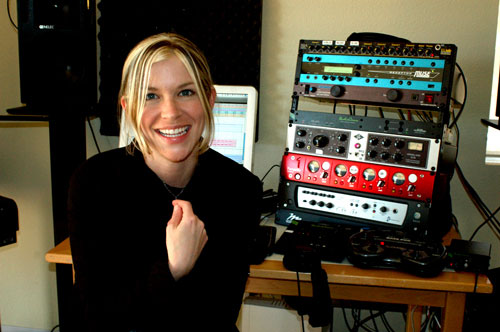
You make it sound so easy…
But it's not. You're missing the four years where I opened for everyone and their mother with label support barely surviving, but now I'm able to tour by myself and actually do okay, but it took years. I kept at it and at it, so for the first three or four years of writing I didn't get anything placed, but by writing with other artists has opened a lot of doors. You just gotta keep at it, and keep it fresh. I think this is not the day or age for one trick ponies unless you are a complete monster at what you do. I'd rather be good at 10 things than really amazing at just one thing.
What would you be doing if you weren't doing what you're doing now?
I'd probably go back to school, get my masters, and teach. Or, I'd start a studio and teach voice and piano.
Would you say music is something you choose to do or something you have to do?
I pretty much have to do it. I don't remember not being musical… I don't even understand what that is! I've been performing for so long…since I was very small.
Who were your biggest influences in your formative years?
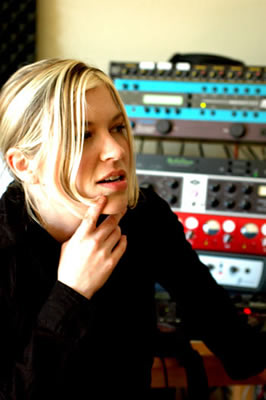 Well, I really didn't start listening to popular music, having grown up with classical, until I moved out of my parent's house with my five crazy art and music major room -mates. That was the time that Tori Amos' "Under the Pink' came out, and someone got me into Disintegration by the Cure and that freaked me out, but probably the most influential music was the early Dead Can Dance records, earlier Peter Gabriel, the first two Tori Amos records, and Kate Bush.
Well, I really didn't start listening to popular music, having grown up with classical, until I moved out of my parent's house with my five crazy art and music major room -mates. That was the time that Tori Amos' "Under the Pink' came out, and someone got me into Disintegration by the Cure and that freaked me out, but probably the most influential music was the early Dead Can Dance records, earlier Peter Gabriel, the first two Tori Amos records, and Kate Bush.
Aha! I thought you might have been influenced by Kate Bush. Has she influenced you from a song-writing perspective or from a performance / production perspective?
Primarily through her voice. Sure, her orchestration and her production style has influenced me, but it was mostly her voice and use of backing vocals that really intrigued me as a young writer.
What about keyboardists? Anyone you really look up to?
I like Tori's piano playing, her early records influenced me a lot. And then I went through a serious Ben Folds Five phase… there's a sprinkle of that in my first record that never came out (One Girl Army). I was really into "Whatever and Amen" I just really think he's outstanding, and one of the best live pianists I've ever heard.
Do you ever listen to music by the famous jazz pianists? Herbie? Chick?
I don't really listen to Jazz. That's on my list of things to do before I die: Understand Jazz. Its uncharted territory for me, I don't know a lot about it except it scared me in college!
Speaking of scary, what do you think of Michael Jackson's nose?
Is it still there? Does he still have one? Bless his little heart, you know?
(laughing) Let's talk a little specifically about "Stromata". I heard the first track off your website, and was so intrigued I went out and bought the CD. Since then, the CD has proceeded to occupy a huge amount of time listening to it again and again and enjoying it as it unveiled itself. I find that situation rather unique since most music these days doesn't hold up well to repeated listening - at least in my opinion. So much music these days is….
Generic?
Right. And almost fake! It's like eating artificially-flavored processed cheese food, versus eating a chunk of really sharp mature cheddar. For lack of a better analogy… and that's not to say your music is cheesy by any means.
(laughs) But I know what you mean, if I'm eating cheese I'd rather it be Parmesean Reggiano versus that fake stuff in a can, ya know? I wanna be a $15 a pound brick of really great cheese that you have to work at and grate before you can eat it and understand its full potential… and only then can you put it over a spicy plate of sausages with red sauce or artichoke ravioli.
Sounds good…. You're making me hungry. (laughs) But leaving the world of cheese and going back to "Stromata": Each track is really its own unique and diverse world. The album covers a huge range of styles and emotion, and employs a large vocabulary of soundscapes. How as an artist are you able to create such range in just a single slab of polycarbonate?
I think it's because I worked for 4 years on "On Your Shore" for RCA, which is a record I'm very proud of, although was very difficult for me. In fact this is where Ken was really played an important role as a producer. "On Your Shore" was a record from top to different that was cohesive. The songs were all very different, but the general vibe and approach was consistent. It was recorded all live, no click, and it had a lot of orchestra, a lot of horns. I was really into "real" stuff then. And I've always been into drums, so "Everytime it Rains" had over 90 tracks of drums… overdub after overdub…with no click. It was really a monster. So I really didn't want to make the same record twice.
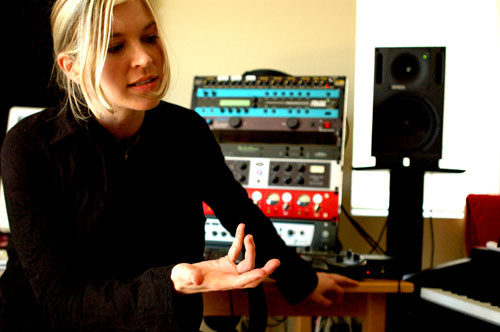
Whoa.
Yeah. So when I started writing Stromata and was making demos in my home studio, I kinda got bored of acoustic piano as the main feature. As it turns out, as I dove more and more into Battery, and Atmosphere, and I took the opportunity to do something that I got off on. And one of the things that I get off on is not hearing the same thing over and over. I wanted to do something that could skate all the different styles of music I was into, like Dead Can Dance, NIN, and the latest Kate Bush record. I just went for the wackiest, craziest sounds, but chose sounds that I still thought were beautiful.
And the sounds are really amazing.
I really got into programming… like the sound "Pills" is all Garritan Personal Orchestra, and I programmed every bit of it. And "Cut the Cord" and "Drip" I programmed everything and Ken mixed it, adding a couple of drum parts in the bridge. Most of the record I programmed and played everything by myself. "To Dance" used a milk jug, a wooden spoon, and high heels to make all the percussion sounds.
How did you come up with such a diverse palette of sounds? Do you just audition every sound at your disposal and pick the ones you want, or do you end up having to create them from scratch?
Sometimes I'll know that I want a sound that I have readily available, and sometimes the sounds inspire the song itself. For example, "Cut the Cord" was written off an 8 bar loop I created in Battery, and wrote the song on piano from there. I usually start with drums.
Did you use drum samples and program the parts or did you use loops?
I used some Acid loops, and Battery, and some GPO. I like to play the drums with my fingers on the keyboard.
Tell me about some of the specific tools you're using. Do you use a lot of plug-ins?
Yeah, I use a lot of plug-ins. I use Massive, Atmosphere, pretty much all the Native Instruments stuff, I'm going to be getting DFH, I have Ivory, Minimonsta, Elektrik Piano, Velvet, Hybrid, B4… and loops from here to eternity. I have Lounge Lizard, and a C3 Yamaha grand piano that I record with. I've unloaded a lot of my synths, I use Receptor to record most of the time now, although I have a few hardware synths like a Korg, a Virus that I use, a CLP electric piano, and an S-90 I use live.
Speaking of live, what is your live rig like?
I play live with Fern (Fernando, my drummer) and live I use a Korg Triton, an S90 that I use as my controller, and I have a Virus as well. My core sounds come from my Receptor, and I mix the other synths in with the Receptor using an external mixer. I control everything with a Ground Control foot pedal – I hit a patch on the pedal, it sends patch changes to Receptor as well as the other synths… I control like 6 sounds at once… it's fun! And none of the sounds are factory - I tweak every sound, including every Ivory patch that has been modified in some way. Every song has its own unique sound. It's a keyboard player's dream to play with this set up.
We're really flattered you're using Receptor, by the way.
I LOVE Receptor. It's my show - the brain of my tour. My Receptor has been around the country four times, and I use it every day. I use it on the road and in the studio. It's awesome, I honestly love it. And it's easy to use, I have to say! It overwhelmed me a bit at first, but Ken read the manual before I did, and once I figured out how to load up a channel with instruments and effects, it was not hard at all.
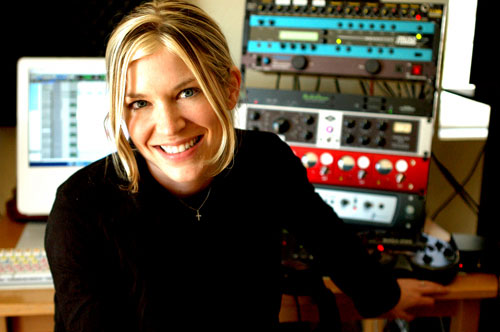
It's a different paradigm… its not really a hardware synth since it is entirely software based, but its also not like a computer since there is no desktop and it doesn't act like a computer. It's kind of a hybrid, and once you get your arms around that, its hard to go back to the old way of running virtual instruments…
It's a keyboard player's dream. There is no other way I could manage what I do play without it. And it's so easy to blend piano and celeste, or moog sounds with harp, or mix some Virus sounds with Ivory. It's a tweaker's dream, and the best thing about it is that I'm able to do all of this on the fly performing live. It's really creative.
What problems does Receptor fix for you when playing live?
We couldn't figure out how to perform "Stromata" live! We were really bummed about the thought of having to have a bunch of tracks playing on ProTools, especially since I could actually play everything, and I really didn't want to get locked into the same show every night. And heaven forbid the Pro Tools rig goes down…this way I have all the keyboard sounds and a drummer, and we can make a whole show happen without Pro Tools if we have to. In fact a lot of songs are just Receptor plus a couple of other keyboard sounds. It's a lot of fun.
If you didn't have all this technology available to you- say this was 20 years ago- do you think you could write such interesting music without all the technology that is currently available to you? How does modern technology affect your writing?
No. There's no way I could do what I do without the technology that's available today. I'd hope I would still make interesting records, but I wouldn't enjoy it as much, I think. One reason why "Stromata" is so inspired is that I was able to discover sounds I had never heard before, and was able to make unique sounds.
So technology definitely affects the way you write?
Definitely. I wrote a lot on piano, but if you were to take away the technology I have now, it would be taking away a whole palette of color that is super important to my work now. I am definitely an electronic artist. I'm a classical artist too, but I'm definitely more interested in the sounds I can find through technology… its an adventure to me.
Speaking of adventures, let's talk about something more controversial. Certainly technology has the potential to help truly talented artists get their message out through online music distribution. And for just a few hundred bucks, you can turn your computer in to a studio. Hopefully that means that with less "filters" in the market, more deserving artists will be able to express themselves. However, there's a downside: with fewer "filters" and barriers to entry, anyone who thinks they have something to say musically can now do so, and that means that more garbage might find its way into an already garbagy market. I know that sounds kind of controversial, but where do you stand on that? Has greater access to studio technology lowered the quality of music we have available?
That's a tough question, but a very good one. I can't speak negatively towards anyone wanting to make music or to have his/her own studio. People who are inspired to be musicians or to make music should be able to become artists if they want to, and no one should judge them for that. I mean I have a home studio, and if someone were to say that I could only record at Cello studios, that would really bum me out.
But what about the idea of testing a musician's commitment to their art? Thanks to technology, there is no longer any requirement that you even know how to actually play your instrument before you can make a record! It used to be you had to be very very serious about music to afford studio time, now anyone can be a recording engineer / producer.
I know what you're saying. But you just never know who's going to do something interesting. I've seen it happen over and over where people who over the course of a few of years went from terrible to great. Of course you need raw talent, but people are capable of transforming themselves, and I'm glad I'm not one of the people who told someone who 8 years ago was terrible to do something else! I can't gauge what's going to sell and what's not going to sell... the public does that.
The thing you figure out is that if you're not able to make a living at it, then perhaps you shouldn't be doing it. Of course, if you're doing it as a hobby, that's great, but if you are trying really hard to make it your career – to make a living at it- and doors keep shutting on you… well… I know if that were me, and I had come out here eight years ago and no doors ever opened for me, I would have moved back home and would have figured out pretty quick that this was something I wasn't meant to do.
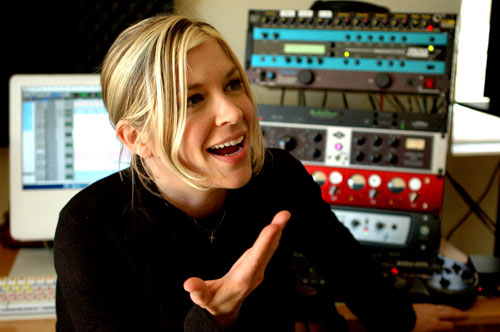
What about my concern that the more people making music, the noisier the market gets, which makes it all the more difficult to find those artists who really have something to say that is unique, or interesting, or even just well done?
You're right, this makes the market way more competitive than it used to be, and it does make it harder to get heard. But I have a problem with saying that you can't do this if someone is inspired to do so. I think that even if no doors open for someone, and they don't make a living from it, they will have learned something through the process of making art on any level. Making music is healing, and important, and it has the power to transport you to a whole other place in your life to a new cerebral and spiritual realm. If someone has the desire to do that, and experience that, they should have that opportunity, because I know what it does for me. It's saved my life... so I would never say, "You're not good, you should not be allowed to do this". That's just not right. They should be allowed to do this, but I'd pray to God that they would figure out whether they suck, and do that sooner rather than later. If the doors don't open, the doors don't open, and that should be the end.
How did you figure all this out?
Experience! I was really miserable while being signed to RCA…only to have them sit on me for 3 years. It was awful - no record, no touring, no nothing – they were just trying to figure out what to do with me. You learn to be really patient, and I could have sat around and cried all day but instead I said "Ken, help me buy some gear".
So I just wrote my heart out, and learned all I could about recording, and waited for the right A&R person to get hired, and had to find the right manager at the right time and write the right song . Then all of a sudden I was touring and working. All I ever really wanted to do was to work… my whole belief was that as long as I was working, I'll be happy. If I can do it, and it pays my bills, then I've made it. It took a long time to figure it out, though.
Speaking of Ken, how did you two meet - your former engineer / collaborator turned husband?
We met through a mutual A and R friend from Epic (Ken was on Epic) and he gave me a couple of Ken's records. I had heard of him through a former boyfriend, so I was familiar with his name, and really liked his work. Ken was mixing the first Tenacious D record, who were signed to Epic as well, and I am an huge Jack Black fan. So my A & R friend asked me if I wanted to come to a session and hear the mix of the Tenacious D record, and I was all freaked out. I'm not really a "sceney" kind of person, so I didn't know how many people would be there, and I was really apprehensive. I had a college friend visiting, so I asked if she wanted to go to a recording studio with me and she said yes. So I met Ken, he shook my hand, and he didn't even look me in the eye! I sat with my friend and listened to 4 or 5 tracks, and laughed and laughed. Ken didn't say anything to me during the session, but a few days later my manager called me saying "Hey Char, why is Ken Andrews calling and asking for your number?"
So my manager gave me Ken's number, and I was thinking that maybe he wanted to work with me, but that didn't make sense since I had just finished "One Girl Army" with Tom Rothrock… and Ken had the same manager too, but I called him and we set up a lunch. Well, the lunch turned into 9 hours… and that was 6 years ago. The end.
Do you find it hard to be married to someone who is also intensely creative?
No, we're partners in everything. Ken started recording me when I was on RCA before I had a budget. Those few songs we recorded together were really great, and when the A&R person heard them they just said that I should make the record with Ken. They were a little apprehensive to make a record with my boyfriend, especially since he hadn't done a lot of big budget records, but this A&R guy let us just do it. We fought a lot, but we learned a lot.
One last question. What was it like growing up with Ricky?
(laughs) Isn't he Latin?
Aren't YOU?
My real name is Shakira, not Charlotte…
Okay, glad we got that sorted out. Now the real last question: what question didn't I ask that you wished I had?
Actually we've pretty much covered everything. Except maybe what is next for me…
Aha! So what's next for you?
Well, I'll be doing a tour this Fall in support of "Something Like a DVD" my first DVD (which is out now) as well as a new album called "Reproductions" where I'll be doing a number of covers.

We'll look forward to being able to see you live. Well, I think that about wraps it up. Thanks for your time.
Actually, thank YOU. I couldn't tour or make my records without Receptor, so tell everyone at Muse Research thank you for making such a cool product.
We're blushing… and we're pleased to have you as a customer.
It's my pleasure. Thanks again.
Check out Charlotte Martin's new CD
and catch her amazing live show





 Well, I'm originally from Charleston, Illinois, a small farm town about an hour south of Chicago. Both of my parents are musicians; my father is an Oboe professor and my mom was a music teacher for many years. I grew up around music and started playing Piano at age 3, and then when my parents figured out I could sing, I started voice lessons when I was about 7. I continued through high school and went to college and studied opera.
Well, I'm originally from Charleston, Illinois, a small farm town about an hour south of Chicago. Both of my parents are musicians; my father is an Oboe professor and my mom was a music teacher for many years. I grew up around music and started playing Piano at age 3, and then when my parents figured out I could sing, I started voice lessons when I was about 7. I continued through high school and went to college and studied opera.  But I was not afraid enough to back out apparently! Sure, I was lonely when I first moved to LA, but I think I was smart… It was terrifying for me to drive in LA, so I stayed in my little apartment and wrote music and practiced for about 8 hours a day. So about 9 months after doing that, booked my first show and got signed to Bongload Records, got my first manager, and four months later I was showcasing for major labels. I had about a year's worth of money saved up, and it was about a year and four months before I finally had a record contract.
But I was not afraid enough to back out apparently! Sure, I was lonely when I first moved to LA, but I think I was smart… It was terrifying for me to drive in LA, so I stayed in my little apartment and wrote music and practiced for about 8 hours a day. So about 9 months after doing that, booked my first show and got signed to Bongload Records, got my first manager, and four months later I was showcasing for major labels. I had about a year's worth of money saved up, and it was about a year and four months before I finally had a record contract. 
 Well, I really didn't start listening to popular music, having grown up with classical, until I moved out of my parent's house with my five crazy art and music major room -mates. That was the time that Tori Amos' "Under the Pink' came out, and someone got me into Disintegration by the Cure and that freaked me out, but probably the most influential music was the early Dead Can Dance records, earlier Peter Gabriel, the first two Tori Amos records, and Kate Bush.
Well, I really didn't start listening to popular music, having grown up with classical, until I moved out of my parent's house with my five crazy art and music major room -mates. That was the time that Tori Amos' "Under the Pink' came out, and someone got me into Disintegration by the Cure and that freaked me out, but probably the most influential music was the early Dead Can Dance records, earlier Peter Gabriel, the first two Tori Amos records, and Kate Bush.




